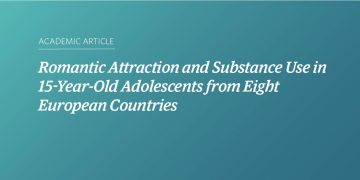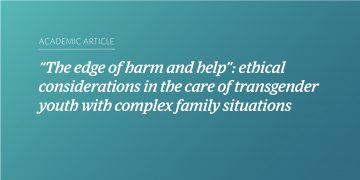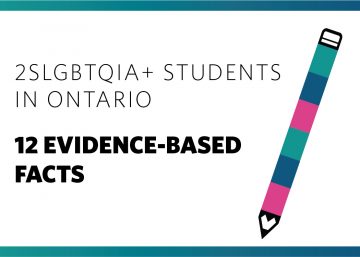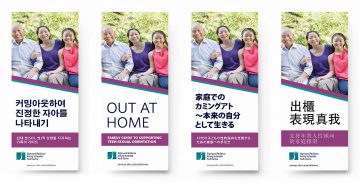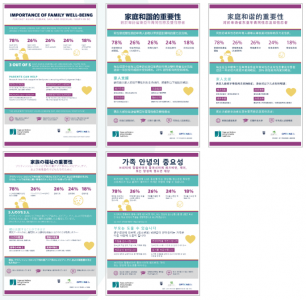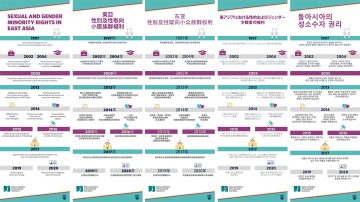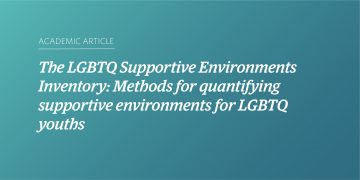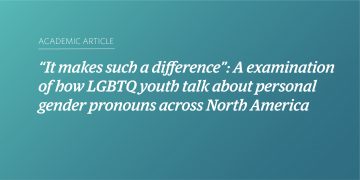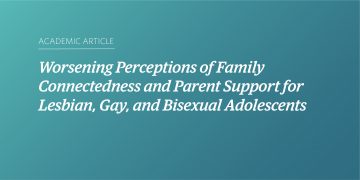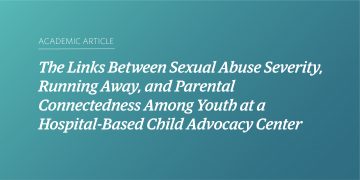Romantic Attraction and Substance Use in 15-Year-Old Adolescents from Eight European Countries
Abstract Purpose Sexual minority youth are at higher risk of substance use than heterosexual youth. However, most evidence in this area is from North America, and it is unclear whether the findings can be generalized to other cultures and countries. Methods In this investigation, we used data from the 2014 Health Behaviour in School-aged Children […]
“The edge of harm and help”: ethical considerations in the care of transgender youth with complex family situations
Health-care providers frequently face clinical ethical dilemmas when working with transgender youth who require hormone therapy but lack parental support for this intervention. Through semi-structured interviews and grounded theory analysis, we explored ethical and clinical decision-making processes of health-care providers, as well as the health care experiences of trans youth with family discordance.
LGBTQ+ Students in Ontario: 12 Evidence-Based Facts
This fact sheet presents research findings about 2SLGBTQIA+ youth and their cisgender and heterosexual peers in Ontario, Canada, and beyond.
Out at Home: Brochure Resource
A brochure to support East Asian lesbian, gay, and bisexual youth and their families. Available in English, Traditional and Simplified Chinese, Korean, and Japanese.
Importance of Family Well-being for Lesbian, Gay, and Bisexual East Asian Youth
The following infographic shows key findings from the research into health outcomes among LGB East Asian youth and the role family can play in supporting their well-being. The download is available in English, Traditional Chinese, Simplified Chinese, Japanese, and Korean.
Sexual and Gender Minority Rights in East Asia
The following infographic shows a timeline of sexual and gender minority rights in East Asia. The download is available in English, Traditional Chinese, Simplified Chinese, Japanese, and Korean.
The LGBTQ Supportive Environments Inventory: Methods for quantifying supportive environments for LGBTQ youths
Abstract The social environment in which lesbian, gay, bisexual, transgender, and queer (LGBTQ) youths live influences health and well-being. We describe the development of the LGBTQ Supportive Environments Inventory (LGBTQ SEI), designed to quantify the LGBTQ-inclusiveness of social environments in the United States and Canada. We quantify aspects of the social environment including: (1) presence/quality […]
“It makes such a difference”: A examination of how LGBTQ youth talk about personal gender pronouns across North America
ABSTRACT Background and purpose: The World Health Organization has developed standards for youth-friendly health services to support adolescents and encourage health care utilization among youth. Necessary building blocks for youth-friendly care include strong interpersonal relationships between youth and health care providers. Nurse practitioners (NPs) may be particularly well positioned to form these relationships. This study […]
Worsening Perceptions of Family Connectedness and Parent Support for Lesbian, Gay, and Bisexual Adolescents
Abstract Objectives Lesbian, gay, and bisexual (LGB) adolescents often report compromised relations with their families. Given the recent changes in societal attitudes toward LGB individuals, in respect to rights for marriage and other legal statuses, we explore whether or not there has been a change in how LGB and heterosexual adolescents perceive their family relations […]
The Links Between Sexual Abuse Severity, Running Away, and Parental Connectedness Among Youth at a Hospital-Based Child Advocacy Center
Abstract Purpose Runaway adolescents often have strained relationships with their parents. Given parental support is an important protective resource for traumatized young people, understanding differences in support within parent–adolescent relationships could aid in designing more effective interventions. We hypothesized (1) runaway adolescents seen at a Child Advocacy Center (CAC) would have poorer parental relationships than […]
